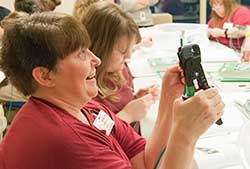University Communications and Marketing
IT skills developed on the inside help prisoners succeed on the outside
May 1, 2014
Contacts:
Bruce Brumley, City College, 247-3081
Annamae Siegfried-Derrick, Montana Women’s Prison, 247-5102
Carmen Price, University Relations, 657-2269
MSU BILLINGS NEWS SERVICES — A Montana State University Billings City College pilot program, in conjunction with the Montana Department of Corrections, is giving women prison inmates a new route to reintegration into society through technology.

On May 29, a group of inmates at the Montana State Women’s Prison will graduate from a computer networking course based off the Computer Technology Industry Association’s A+ Certification curriculum offered at City College.
From barely knowing how to open Microsoft Windows programs when entering the class in January, students are performing more advanced work such as troubleshooting common Windows problems.
In a recent class, inmates worked their way through assembling Ethernet cables developed for networking.
“I haven’t been in school since the 10th grade,” inmate Julie Balback said. “I want to learn as much as I possibly can. Most jobs today are geared around computers and when I get out of here, I want a lasting job.”
The 48-year-old is one of 14 students completing the college-level course instructed by recent City College graduates Scott Atkinson and Phil Shelton—both having received associate degrees in computer systems technology on May 3.
 Through the Second Chance Act technology grant, awarded to MDOC by the Department
of Justice in late 2013 and coordinated through MSUB’s Extended Campus, Atkinson and
Shelton teach the rigorous, hands-on course four nights a week, providing IT skills
to help inmates find jobs upon release.
Through the Second Chance Act technology grant, awarded to MDOC by the Department
of Justice in late 2013 and coordinated through MSUB’s Extended Campus, Atkinson and
Shelton teach the rigorous, hands-on course four nights a week, providing IT skills
to help inmates find jobs upon release.
John Daugherty, chief information officer of the MDOC, said providing technology coursework in the prison system is crucial to decreasing the state’s recidivism rate.
“We believe in the rehabilitation process and by providing an education and a marketable job skill, we are able to provide a greater chance that our inmates are not as likely to reoffend,” said Daugherty. “Teaching technology plays a big role because it changes so fast.”
The main objective of the A+ class is to provide inmates with a springboard for future college and job opportunities once they are released from prison, Daugherty said.
The curriculum covers the fundamentals of computer hardware and software as well as advanced concepts such as security, networking, and the responsibilities of an IT professional.
Prisoners are eligible for the program if they are willing to commit to the demands of the course. Following the course, the students can choose to take the certification exam. With A+ certification, they would be qualified for jobs ranging from computer support in IT departments to technology support with the Geek Squad at Best Buy.
“Society is reliant on technology. It’s pretty crucial when inmates are released back into society that they know more than just the basics,” Shelton said. “Anymore, just applying for jobs requires significant computer and software knowledge.”
Balback said that without the opportunity, she probably wouldn’t have known her potential.
“I want something better for my life,” she said. “I deserve better than what I’ve always settled for in the past. This class has helped open my eyes to see this.”
Holding the cables close to her eyes, she extended her arms to refocus on the Ethernet cable she had just connected. “I got it,” she shouted. “Mine is perfect, or at least not bad for an old lady.”
 Balback has come a long way from the first day of class, Atkinson said.
Balback has come a long way from the first day of class, Atkinson said.
“There was trepidation among many of the women in the beginning,” he said. “None of the women had ever opened a computer case before this class. But when they learned they were capable of doing this, really they just sort of exploded in their sense of knowledge and confidence.”
Bruce Brumley, City College computer technology faculty member and the top Cisco Networking instructor in the United States and Canada, oversees the course and its instructors. He said the content they teach in the prison is nearly identical as the curriculum taught in the computer technology program at City College and Cisco Networking Academy.
“These women work as hard, if not harder, than some of my students,” Brumley said. “They understand the class is a privilege and they treat it just as that. They take it very seriously and study the materials for hours each day.”
Atkinson and Shelton also take the class seriously, Brumley said. Prior to graduating from their program, they instructed the class in addition to a full course load and, in Atkinson’s case, a family to care for, in exchange for a small stipend.
“I think it’s a worthwhile experience for them,” he said. “Scott and Phil are applying what they’ve learned in their program to a very interested group of ladies in the IT field—quite a non-traditional group, to say the least.”
Brumley said he approached Atkinson and Shelton to teach the course because of their past experiences—Atkinson, a high school English teacher in Wyoming for four years and Shelton, a corrections officer for the Montana State Prison for seven. Combined, they make for a great team, he said.
“The experience has been rewarding,” Atkinson said. “The course is giving these women a chance to rebuild, a point to stand solid, and the support that maybe they didn’t have in home, life or school. That in itself makes it worthwhile.”
The May 29 commencement begins at 9:30 a.m. at the women’s prison.
For more information about the commencement ceremony, call Annamae Siegfried-Derrick, community relations director for the Montana Women’s Prison, at 247-5102.
PHOTOS ABOVE:
1) Scott Atkinson, recent City College computer systems technology graduate, reviews a computer networking troubleshooting assignment with a group of inmates at the Montana Women’s Prison as part of a pilot program with the Montana Department of Corrections. The program aims to teach IT skills to help inmates find jobs upon release.
2) Phil Shelton, recent City College computer systems technology graduate, instructs a group of prison inmates on how to assemble Ethernet cables developed for computer networking.
3) Julie Balback, 48, is one of 14 women participating in a Montana State University Billings City College pilot program, in conjunction with the Montana Department of Corrections, that provides women prison inmates a new route to reintegration into society through technology.
